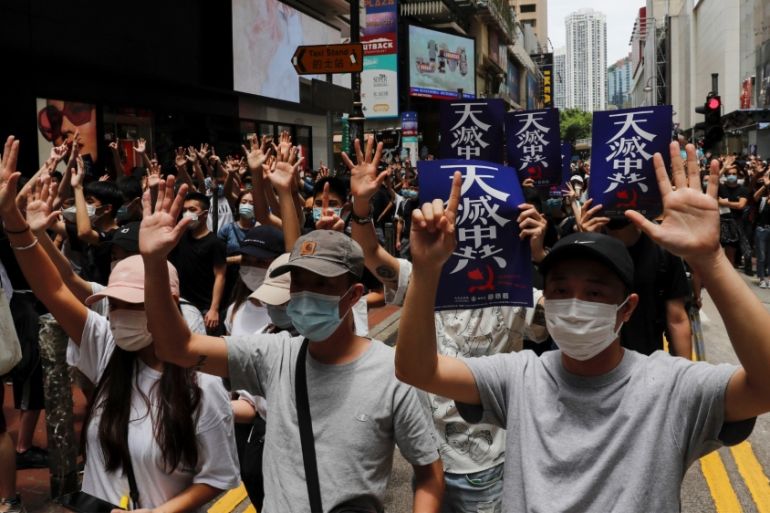Hong Kong stocks extend slide on China concerns
China’s proposal to impose a new security law on Hong Kong has rattled investors in Asia.

Asian investors remained wary on Monday as the United States and China traded barbs over Beijing’s plan to impose a security law on the semi-autonomous city of Hong Kong.
A gauge of Asian stocks pared early gains, with Hong Kong shares extending losses on mounting fears about the city’s future as a key trading and financial hub in the region.
Keep reading
list of 3 itemsHong Kong stocks get hammered after China plans new security law
Can Chinese companies be barred from US markets?
MSCI’s broadest index of Asia-Pacific shares outside Japan fell 0.1 percent after starting higher, with China’s blue-chip CSI300 index down 0.2 percent.
Hong Kong’s HSI index dove 1.4 percent to a two-month low after sinking 5.5 percent on Friday.
But South Korea, Australia and New Zealand were trading higher while E-minis for S&P500 were also slightly upbeat.
And Japan’s Nikkei jumped 1.5 percent after the Nikkei newspaper reported the country was considering a fresh stimulus package worth more than $929bn that will consist mostly of financial aid programmes for companies hit by the coronavirus pandemic.
Rising trade tensions also hit oil prices with US crude falling 10 cents, or 0.3 percent, to $33.15 per barrel. Brent crude was down 25 cents, or 0.7 percent, at 34.88.
Analysts expect overall trading to be subdued with US and British markets shut for public holidays.
“One big threat to the recovery in markets is the escalating war of words between the US and China,” Shane Oliver, head of investment strategy at AMP Capital Investors Ltd. in Sydney, told the Bloomberg news agency.
“The main focus will likely remain on continuing evidence that the number of new COVID-19 cases is slowing in developed countries, progress towards medical solutions, the reopening of economies and signs that economic activity is picking up.”
On Friday, China proposed imposing national security laws on Hong Kong that critics see as a turning point for the former British colony.
The proposal at the annual session of parliament, or National People’s Congress, drew the ire of Hong Kong residents who defied physical distancing rules and protested on the streets over the weekend while the US warned that China’s move could lead to sanctions by Washington.
The US Department of Commerce also added 33 Chinese companies and other institutions to a blacklist for committing human rights violations.
Chinese Foreign Minister Wang Yi has warned that US leaders are potentially pushing towards a new Cold War and that the administration should give up any “wishful thinking” of changing China.
Sino-US ties have nosedived since the coronavirus outbreak, with US President Donald Trump accusing China of a lack of transparency over the origins of the virus.
The two superpowers have also clashed over Hong Kong, human rights, trade and US support for Chinese-claimed Taiwan.
“Rising tensions between the US and China around Hong Kong, trade policy and who is responsible for the 2020 economic dislocation is threatening to end the post-March-trough rally,” said investment firm Perpetual analyst Matthew Sherwood.
Global equity markets have surged about 30 percent since hitting a low in early March, driven largely by policy stimulus measures by governments and central banks.
“There is a plethora of headwinds brewing to have investors question their expectations, including earnings downgrades, balance sheet deleveraging, the absence of a [coronavirus] vaccine and rising geopolitical tensions.”
Global financial markets were already struggling to deal with mammoth economic uncertainty emanating from coronavirus lockdowns, with central banks slashing interest rates and pumping in huge sums of money into banking systems.
Many governments have also announced heavy spending to support economic growth. But optimism around an economic bounce following re-openings and stimulus is fading.
Action in currency markets was muted.
The US dollar was a shade higher against the Japanese yen at 107.65. The euro held near a one-week trough at $1.0895. The British pound added 0.1 percent to $1.2176 while the Australian dollar was flat at $0.6533 after losses on Thursday and Friday.